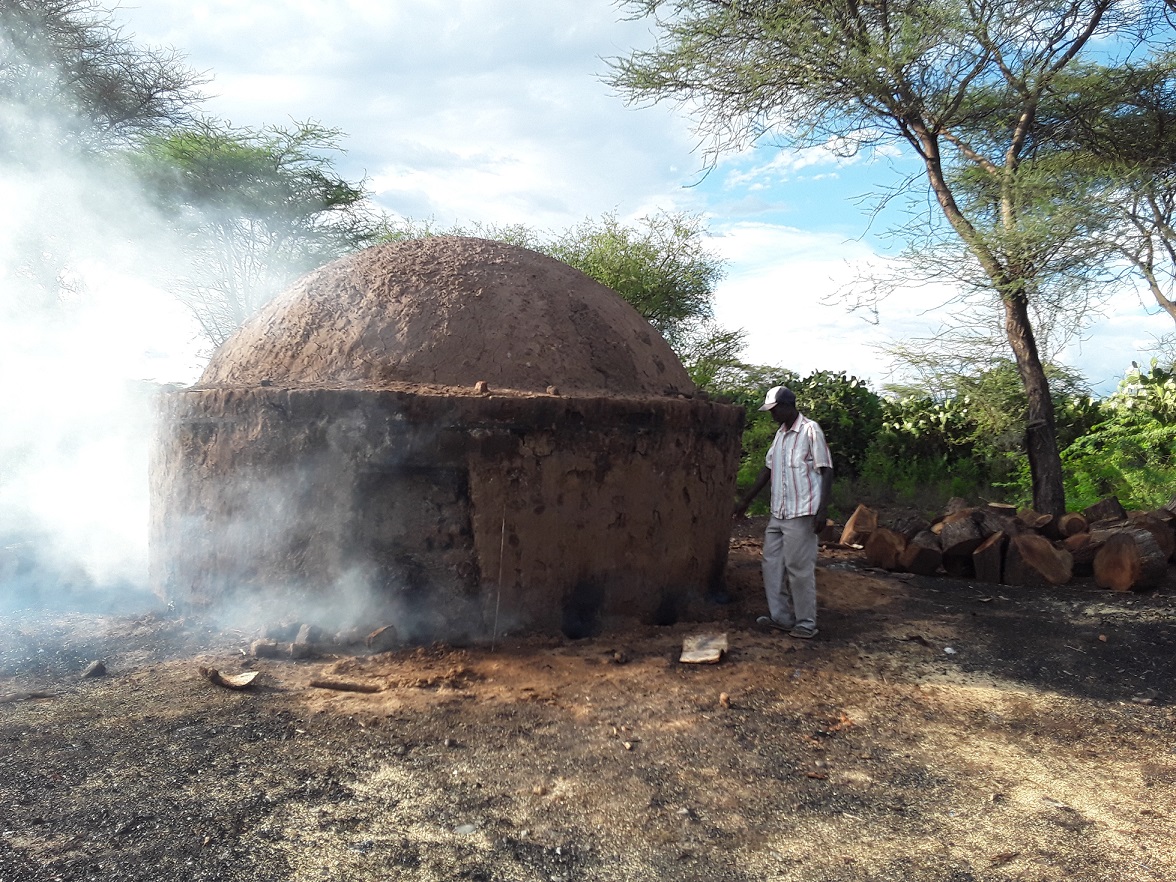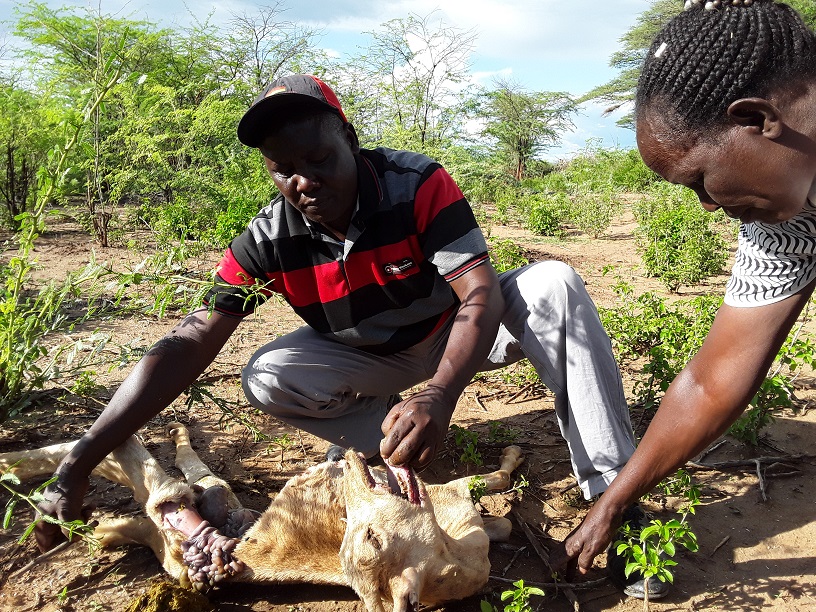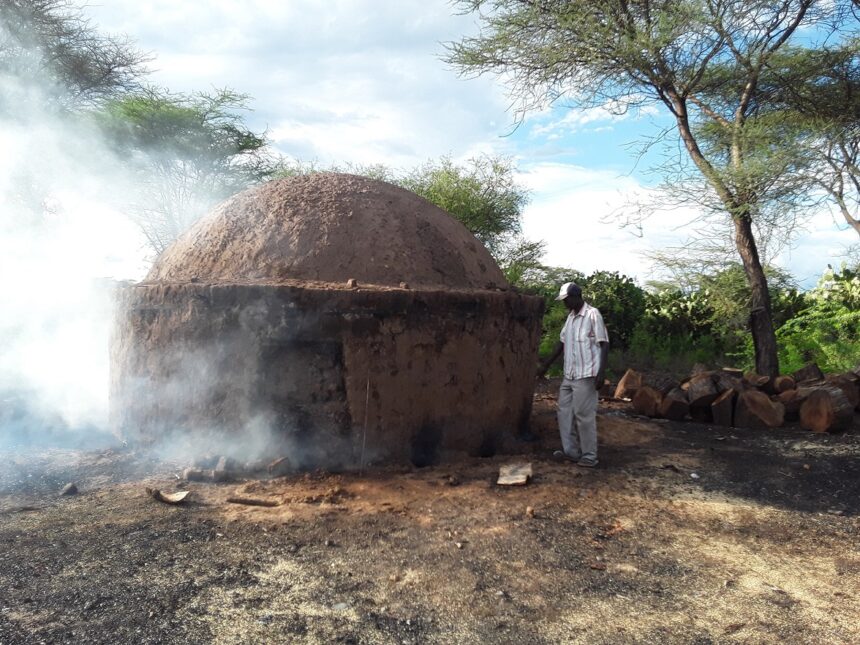
By Joyce Chimbi
Despite the ongoing severe drought in northern Kenya, Marigat Sub-county in Baringo is dotted with lush green vegetation that seems not be affected by the dry spell.
This vegetation is Prosopis Juliflora an exotic plant that was introduced by the government in the area years ago as a windbreaker.
However, the pastoralist communities of the Illchamus, Tugen and Pokot do not want the plant in the area. Locally known as mathenge, plant cannot allow vegetation to thrive where it grows. As a result, it has cleared grasslands and tree cover, leaving the pastoralists with nothing to feed their livestock on and exacerbating deforestation.
The animals cannot feed on it either, as it is poisonous. The sweet pods or fruits of mathenge interrupt digestion in goats and cows, leading to death by starvation.
“The dry seasons are becoming more frequent and longer. Our rivers are drying up and we have to travel longer distances to feed our livestock. We are losing our animals to both drought and mathenge,” says Samwel Montorosi, a resident of Salabani village.
Hannah Sakamo, a pastoralist in Eldepe village, says the community has lost too much to both drought and mathenge.
In this regard, the community is now reclaiming their land from the jaws of the invasive enemy by re-introducing native vegetation, embracing and expanding agricultural areas and grasslands.
The expansive Marigat Sub-county is one of 23 Arid and Semi-Arid (ASAL) regions whose vulnerabilities are multiplied and exacerbated by the most severe drought in the last 40 years.
However, the community is now ready to take climate action in line with Sustainable Development Goal 13 to build resilience against climate change and adopt sustainable practices to save their livelihoods.
To do this, Simon Choge, a senior researcher at Kenya Forestry Research Institute (KEFRI), says the community must first subdue mathenge.
Removing mathenge and replacing it with food crop and grassland, he says, is a climate change mitigation measure. Choge says studies have shown a serious negative impact of mathenge invasion and grassland degradation on soil organic carbon in sub-locations within Marigat.
To progressively increase soil organic carbon and improve soil health, he says removing mathenge is a priority for it does not inter-crop.
Livestock is a lifeline for the pastoralist community. They are similarly vulnerable from the effects of four consecutive failed rainy seasons.
Baringo is one of Kenya’s nine arid counties. As such, Marigat is characterised by severe living conditions, with little annual rainfall of between 150 and 550 millimetres and very high temperatures.
Choge says at the heart of the community’s vulnerabilities is climate change, land degradation and the dominance of a most invasive species that has choked the environment, blocking climate adaptation and mitigation efforts.
Government data shows that across Kenya’s Arid and Semi-Arid regions (ASAL) spanning over 23 counties, the prolonged dry spell claimed an estimated 1.5 million livestock and brought down the cost of surviving livestock by less than 40 per cent.
“Mathenge has very deep roots that reach the sub-surface water. It consumes a lot of water and dries out all other vegetation. It dominates the environment, making it impossible for native plant species to grow,” he says.
Water stresses from effects of mathenge and climate change spell doom for the indigenous community.

In 2006, Montorosi was one of 800 members of the community who sued the national government for introducing Prosopis Juliflora without conducting an environmental impact assessment. The court case led to the 2008 declaration that mathenge was a noxious weed, highly harmful to the environment.
Since then, the community has worked with government researchers to find sustainable solutions to the mathenge menace for it is impossible to build climate resilience without removing the ever-green, prolific and environmentally harmful invasive weed.
“We are changing our way of life. We are now removing mathenge and growing native trees such as acacia and planting crops,” Montorosi explains.
Choge says controlling mathenge is in line with the new National Strategy for the Management of Prosopis Juliflora. He says “mathenge thrives on dormant land. By turning to agriculture, the community is removing a plant that consumes a lot of water and, giving way to the diversification of livelihoods as a way to adapt to effects of climate change and biodiversity loss.”
Research and practice show that it is impossible to completely eradicate Prosopis Juliflora once it dominates an area. The plant can only be controlled, hence the national strategy to manage it as opposed to eradication.
“We have seven charcoal production associations that are helping us to earn a living from mathenge and this is motivating the community to continue removing mathenge to grow food and animal feed,” Montorosi says.
Sakamo says women and youth have taken a lead in embracing agriculture and researchers such as Choge are at hand to advise on the most resilient plants to grow in the arid area.
She says the community started with activism to get the attention of the government and has now evolved to community associations that have led to steps in the right direction.
“Farming is becoming very common in the area. We are planting grass, maize and vegetables. The world is changing and we must change or be destroyed by drought,” Sakamo says.
She says while there are big chunks of land in the area, difficulties in manually removing prosopis thickets means that thus far, the community is farming on an average of three acres of land. But she is quick to add that this is the beginning to bigger and bigger agricultural land.
Scientists such as Choge says the community has taken positive and forward moving strides to reclaim their land and build sustainable practices against devastating effects of climate change. Staying on this track will progressively and increasingly strengthen the community’s capacity to be climate resilient.
This story was produced with support from WWF-K VCA Project and MESHA.









